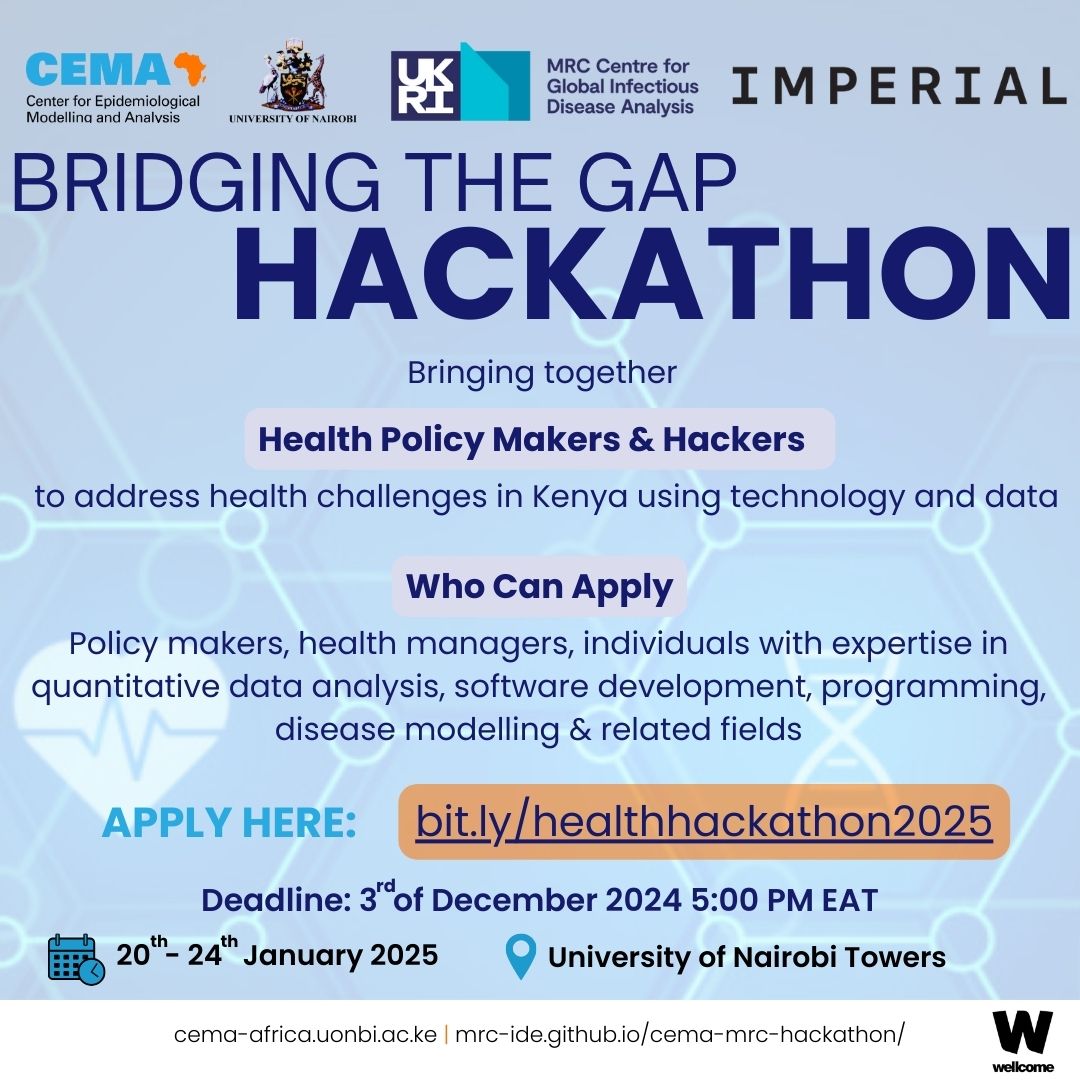Bridging the Gap Hackathon
20-24 January 2025, Nairobi, Kenya
The “Bridging the Gap Hackathon” is a 5-day event to bring together public health decision-makers, developers, technical experts, and academics and researchers to create free, open-source resources to support and facilitate evidence-informed decision making and address health policy needs in Kenya.
Background
Experiences during the COVID-19 pandemic highlighted the challenges decision makers face in interpreting and using analytics for public health policy. To respond to these challenges, researchers at the MRC Centre for Global Infectious Disease Analysis (MRC-GIDA) at Imperial College London and the Center for Epidemiological Modelling and Analysis (CEMA) at the University of Nairobi are currently conducting a research study to explore how the gap between quantitative scientists and policymakers, especially in resource-constrained settings can be bridged.
Who Should Attend
The hackathon aims to include a diverse audience, who will either contribute to idea generation or developing the identified software tools. The latter activity will include core training on collaborative coding best practices, which will be strengthened by the delivery of pre-hackathon virtual training courses and teaching material for enrolled participants.
- Health Decision-Makers & Providers: Ministry of Health officials and public health specialists who provide insights based on real-world public health needs and ensure developed tools address practical challenges.
-
Developers and Technical Experts: Individuals proficient in R programming, version control using Git and GitHub, epidemiological modelling, and software development.
-
Academics and Researchers: Participants from various Kenyan institutions, not limited to CEMA, or MRC-GIDA at Imperial College London who are involved in infectious disease modelling and public health data analysis.
This activity is restricted to up to 30 applicants residing in Kenya.
Cost
There is no cost to attend the hackathon, however, there are a limited number of places available for the hackathon. While we do have some funds to support travel and attendance for participants from outside Nairobi and from MRC-GIDA at Imperial College London, these funds are limited. If you require financial support to attend, please indicate this in the registration form.
Hackathon Schedule
- Day 1: Foundations and Group Formation
- Introductions, icebreaker activities, and team building exercises.
- Sharing of real-world challenges presented by Ministry of Health, health organizations and/or public health specialists.
- Formation of interdisciplinary teams focused on specific public health challenges.
- Overview of Git, Github and collaborative coding practices (GitHub training should have been completed before attending the course).
- Days 2-3: Coding and Collaboration
- Dedicated project work time with guidance from experienced facilitators.
- Continuous interaction and feedback sessions to refine ideas and approaches.
- Day 4: Presentation and Feedback
- Teams present their minimum viable products to Ministry of Health representatives and other stakeholders.
- Constructive feedback and discussions on the relevance and potential impact of the tools developed.
- Day 5: Refinement and Next Steps
- Project refinement based on the feedback received.
- Planning for further development, implementation, and potential scaling of the tools.
- Closing remarks and celebration of achievements.
Venue
The hackathon will be hosted at the smart classroom on 11th floor at UoN towers, main campus, Nairobi, Kenya.
Application
Please register your interest in attending the hackathon using this form by 3rd December, 5pm EAT. The form will ask you to provide a short description of your experience and background relevant for the hackathon. This information will be used to allocate funding for prospective participants to ensure a diverse range of participants and backgrounds.
Click (https://mrc-ide.github.io/cema-mrc-hackathon/) to access the Hackathon website


